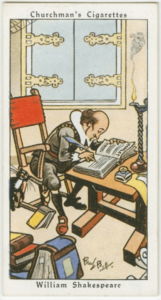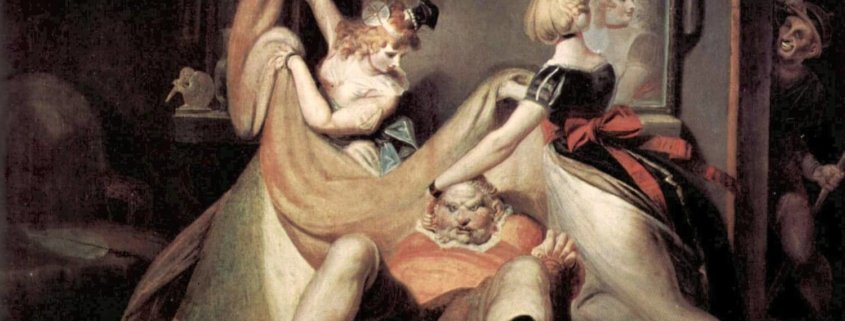The Language of Merry Wives
 As a visual spectacle, The Merry Wives of Windsor is little more than knockabout comedy. It ranges from farce to the subtle humor of gesture. It’s good knockabout, mind you, and despite the preposterous improbability of the plot it is vastly entertaining. Its theater is very domestic and in this respect it can be linked to the comedies of manners of the eighteenth and nineteenth centuries. It abounds in the details of domestic life and as a central theme explores the forces, such as virtue and faithfulness (honesty), that keep daily life on a more-or-less even keel. In the life of the town that is at the center of the play conflict is almost always settled with food. A “hot venison pasty to dinner” is offered as a palliative to Justice Shallow, who fumes that he has been wronged. It is Master Page’s belief that they will “drink down all unkindness.” And at the end of the play, despite the substance of Falstaff’s intrusive campaign against the women, Mistress Page shakes it off and says, “Good husband, let us everyone go home, and laugh this sport o’er by a country fire”.
As a visual spectacle, The Merry Wives of Windsor is little more than knockabout comedy. It ranges from farce to the subtle humor of gesture. It’s good knockabout, mind you, and despite the preposterous improbability of the plot it is vastly entertaining. Its theater is very domestic and in this respect it can be linked to the comedies of manners of the eighteenth and nineteenth centuries. It abounds in the details of domestic life and as a central theme explores the forces, such as virtue and faithfulness (honesty), that keep daily life on a more-or-less even keel. In the life of the town that is at the center of the play conflict is almost always settled with food. A “hot venison pasty to dinner” is offered as a palliative to Justice Shallow, who fumes that he has been wronged. It is Master Page’s belief that they will “drink down all unkindness.” And at the end of the play, despite the substance of Falstaff’s intrusive campaign against the women, Mistress Page shakes it off and says, “Good husband, let us everyone go home, and laugh this sport o’er by a country fire”.
This apple-cart of ordinary life is upset not from within but by a man whose history and aspirations link him to the life of the court. Falstaff walks roughshod over simple rules that keep the community of non-royal Windsor together. He poaches deer, he commits violence against servants, he ignores the locals, he demands attention and above all he interferes with the stability of local women and their husbands. He’s a hustler with a knighthood that allows him, for a time, to get away with very bad behavior. Merry Wives is about how the community of Windsor deals with this attack from outside.
Seeking to find a place for the play in the literary canon, critics over the centuries have talked principally about the language of the play, seeing language as the quality that distinguishes it from other plays by Shakespeare. What critics mean by this is that Merry Wives focuses on the language of ordinary people. Uniquely in Shakespeare almost all of the characters speak in prose. The exceptions are Falstaff, a knight with a silver tongue that in this play deserts him in the face of the unimpressed Mistresses Ford and Page, and Fenton, upper class and apparently educated, whose poetic view of his own destiny sometimes causes him to stumble when practical matters demand action.
All of the characters in the play have recognizable linguistic mannerisms, and what’s more, they are aware of each other’s. They comment on them all the time; they constantly make jokes about them. Mistress Quickly says of Dr Caius: “here will be an old abusing of God’s patience and the King’s English” (1,4,4-5). Master Page says of Corporal Nim, “Here’s a fellow frights English out of his wits.” At the end of the play Master Ford says, aiming his jab at the Welshman Pastor Evans: “I will never mistrust my wife again till thou art able to woo her in good English.”
The habits of speech of the characters are very personal and individual but they also tell us a great deal about their social class and aspirations. Dr Caius and Sir Hugh Evans are the kind of men who hang around and make their fortunes from a court that has occasional need of their otherwise fairly lowly services. They are extremes, “foreigners” whose mangled use of English provides a major source of entertainment in the play. It is not simply that they mispronounce the words – Caius in flagrant franglais , Evans in inf(l)ected Welglish – but their personal misadventures with words. Caius almost always begins a sentence with “I” or “Me”. He is utterly self-centered. Sir Hugh uses nouns instead of verbs or, in some cases, adjectives, or replaces whole phrases with a single noun: “Give ear to his motions, Master Slender, I will description the matter to you, if you be capacity of it.” (1,1,199-200) And a few lines later we get the misuse of the noun together with the ironically hilarious correction of someone else:
It is a fery discretion answer. Save the faul’ is in the ‘ord ‘dissolutely’ – the ‘ort is,
according to our meaning, ‘resolutely’ – his meaning is good. (1,1,236-8)
Other characters also provide us with humor or simple pleasure. The host – in the Curtain production the hostess – of the Garter (an inn in Windsor, which is home to the highest order of English knighthood, the order of the Garter), takes delight in her own use of words. “Said I well…?” she asks (1,3,11) of Falstaff after bandying a trio of words in German, Latin and French. She is playful: “My hand, bully: thou shalt have egress and regress – said I well? – and thy name shall be Brook…” (2,1,195-6). And in the fourth act, speaking to the servant Simple, whose name describes its bearer, she comes up with an ‘inkhorn’ term, a Latinate noun for cannibal: “Go, knock and call: he’ll speak like an anthropophaginian unto thee.” (4,5,7-8). I doubt that anyone in Elizabethan England would have said such a word except Shakespeare when he was writing this play.
One of the funniest mis-users of English is Mistress Quickly. In her multiple jobs as domestic servant and go-between she mixes with a range of people, many of whom are far more educated than she is. She aspires to their use of big words, but she consistently tries and fails to come up with them. She is an arch-exponent of malapropism. “Well, thereby hangs a tale,” says Mistress Quickly of Anne (Nan) Page to her woo-er Fenton. “Good faith, it is such another Nan – but, I detest, an honest maid as ever broke bread … indeed, she is given too much to allicholy and musing.”(1,4,138-142). She means ‘protest’ rather than ‘detest’, though the latter is something perhaps of a Freudian slip; and by ‘allicholy’ she means ‘melancholy’, though there is no doubt that she will have seen that melancholy is often a result of too much alcohol. And in typical Shakespearean fashion her malapropisms often carry a sense that bears directly on some aspect of the play. For example, when she approaches Falstaff as a go-between for Mistress Ford she says “this is the short and the long of it; you have brought her into such a canaries as ‘tis wonderful.” Of course she means ‘quandary’ rather than ‘canaries’, but she is also part-mindful that sack, the beloved drink of Falstaff, might well have been imported (by Page or Ford?) from the Canary Islands. In Act 3 the host(ess) says to Ford, Page and Caius, “I will to my honest knight Falstaff, and drink canary with him.” (3,2,78-9)
The other characters are less defined by their use (or misuse) of language. Ford and Page both speak with the articulate quality of middle-class merchants. Except that Ford’s language is tinged with obsession. He is wordy, almost poetic at times. Page on the other hand can be quite curt, though he is always trying to find words of appeasement. He is a merchant and businessman and needs a calm environment in which to practice his craft. The women, Meg Page and Alice Ford, are rational, practical and quick to find humor but they create their own language of moral urgency in order to deceive Falstaff. Their role-playing while Falstaff is hidden behind the arras or the door gives us two of the most hilarious scenes in the play. The second time Falstaff visits Mistress Ford in hope of getting her into bed, Mistress Page comes in and in a role-playing speech describes Master Ford’s ill-tempered dangerous progress toward the house. After a pause she says: “I am glad the fat knight is not here.” It’s one of the best comic moments in Shakespeare.
Falstaff is the only character who speaks consistently with the poetic weight of the main characters in Shakespeare’s other plays. Even when he is speaking prose, even when he is talking to Pistol about his despicable plan to seduce Mistress Ford, he gives us a complexity that allows us to follow him while getting beneath the surface:
No quips now, Pistol – Indeed I am in the waist two yards about, but I am now
about no waste: I am about thrift. Briefly, I do mean to make love to Ford’s wife.
I spy entertainment in her: she discourses, she carves, she gives the leer of invitation.
I can construe the action of her familiar style, and the hardest voice of her behaviour –
to be Englished rightly – is “I am Sir John Falstaff’s”. (1,3,38-45)
Falstaff is also capable of a kind of tenderness in his speech (ah, the negative capability I talk about in another blog). In All’s Well That Ends Well, the character Parolles, who has many traits in common with Falstaff, is shamed and humiliated for his braggard’s cowardice. Recognizing himself in his own shame he says: “Yet I am thankful. If my heart were great / ‘Twould burst at this.” (4,3,319-20). Falstaff has a similar moment at the end of the play when he realizes he has been exposed and that his belief he could get away with it was false. “I do begin to perceive that I am made an ass,” he says. It is Shakespeare’s genius that he included the condition “begin to” in that line; those words indicate the extent to which Falstaff needs to go to understand the implications of his own behavior. Falstaff then goes on to admit that his rationality had been challenged:
And these are not fairies. I was three or four times in the thought they were not fairies,
and yet the guiltiness of my mind, the sudden surprise of my Powers, drove the
grossness of the foppery into a received belief, in despite of the teeth of all rhyme and
reason, that they were fairies. (5,5,121-6)
There are two further linked aspects of the language of Merry Wives that I would like to mention. It may be that the word ‘merry’ in the title leads us to expect a play that is light in theme and light in performance, and indeed literary criticism has until recently taken it this way. The word ‘merry’ comes from the Anglo-Saxon myrige, which means pleasing or delightful; in this play the meaning is the same with the addition of ‘open’. Thus, when Mistress Page says (4,2,100) “Wives may be merry and yet honest too”, she means that they can be open to others and pleasing to the mind and eye, without throwing their virtue out of the window (with the buck?); that is, being attractive doesn’t mean they’re easy. The title is therefore a preliminary statement of the moral crux of the play, a very serious one during the Elizabethan period and equally serious now: Weinstein, Epstein, Trump. Beauty is not availability.
And beneath the merry surface of the play, not too far beneath it, there is violence in the language that can be quite shocking. Falstaff is convinced by very little that the Mistresses Ford and Page are up for a sexual liaison with him. At various stages throughout the play he lets us know that what he’s after is a boosting of his ego, some sex on the side, and access to their husbands’ money. He doesn’t mind whether it’s Mistress Ford or Mistress Page, and in the final act as he dresses as the buck in the masque of Herne the Hunter he imagines having them both at the same time. Yet for the sake of a minor liaison he raises the stakes very high. He says to Mistress Ford, standing close to her in her own home, “I cannot cog (lie), I cannot prate (go on and on), Mistress Ford; now shall I sin in my wish: I would thy husband were dead” (3,3,42-4). Now, that’s a pretty violent wish. He goes on to suggest, with no intention of following through with it, that he could make her his lady. That is, he would marry her (the correct salutation for the wife of a knight is Lady; she would be Lady Falstaff).
When I began to take note of the violence threatened or described in the play, it surprised me just how much of it there is. And it is not all Falstaff. Doctor Caius, billed by the Host(ess) as a wise physician 2. 3. 50, nonetheless threatens to castrate the Welsh parson Sir Hugh: “By gar,” he says, “I will cut all his two stones. By gar, he shall not have a stone to throw at his dog.” (1,4,104-6) In return, in a later scene, Sir Hugh uses his equally hilarious English to threaten the same of Dr Caius: “I will gnog his urinals (genitals) about his knave’s costard (head) when I have good opportunities…” (3.1.13-14)
In equalling this violence of language, Master Ford speaks with bitter, wounding sarcasm of and to his wife in the second scene in which Falstaff is in the house. “Mistress Ford, the honest woman … I suspect without cause, do I?” he says sharply, and when she replies “God be my witness you do, if you suspect me of any dishonesty,” he replies with the voice of a somewhat bewildered patriarchy: “Well said, brazen-face, hold it out!” (4,2,121-128) Ford therefore compounds the violence toward his wife that Falstaff started.
There is always so much to Shakespeare’s language. It is impossible to grasp it all at once, and I am sure that we members of the audience will manage to receive only a part of what is offered. But it is always somewhat wonderful in a Shakespeare production that even if we miss the subtleties of specific words or phrases we so often leave with an enlarging, enlightening sense of the multiplicity of character, of speech, of action and of life.





Leave a Reply
Want to join the discussion?Feel free to contribute!